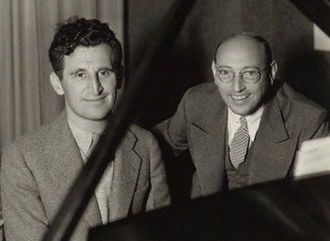INFORMATION
| Artist Birtday : | 27/01/1895 (Age 79) |
| Born In : | New York City, U.S. |
| Occupation(s) : | composer, screenwriter |
Harry Rubenstein (January 27, 1895 – February 23, 1974), known professionally as Harry Ruby, was an American composer and screenwriter, who was inducted into the Songwriters Hall of Fame in 1970. He was married to silent film actress Eileen Percy.
Biography
Ruby was born in New York City, United States. After failing at his early ambition to become a professional baseball player, he toured the vaudeville circuit as a pianist with the Bootblack Trio and the Messenger Boys Trio, until meeting the man who would become his longtime partner, lyricist Bert Kalmar. Kalmar and Ruby were a successful songwriting team for nearly three decades until Kalmar’s death in 1947, a partnership portrayed in the 1950 MGM musical Three Little Words, starring Fred Astaire as Kalmar and Red Skelton as Ruby.
A good friend of Groucho Marx, Ruby appeared several times on his television program, You Bet Your Life. In his 1972 concert at Carnegie Hall, Marx gave the following introduction before performing a song of Ruby’s: “I have a friend in Hollywood … I think I do, I’m not so sure. [laughter] His name is Harry Ruby [applause] and he wrote a lot of songs that I’ve sung over the years …”
- Today, Father, is Father’s Day
- And we’re giving you a tie
- It’s not much we know
- It is just our way of showing you
- We think you’re a regular guy
- You say that it was nice of us to bother
- But it really was a pleasure to fuss
- For according to our mother
- You’re our father
- And that’s good enough for us
- Yes, that’s good enough for us
In The Dick Cavett Show, recorded June 13, 1969, Marx also sang a second stanza, and introduced it with, “Isn’t that a beautiful melody? And a beautiful sentiment: … Today, father, is father’s day. … 16 men in that orchestra: nine of them are illegitimate children [laughter]. Nine and a half including the director.”
- The tie that you got
- Didn’t cost such a lot
- And we’ll give you the same tie next year.
- You tell us it was nice of us to bother
- But it really was a pleasure to fuss
- For they say, a child can only have one father
- And you are the one for us.
- And you are the one for us.
Selected film scores
- Animal Crackers (1930)
- Horse Feathers (1932)
- Duck Soup (1933)
- Bright Lights (1935)
- Walking on Air (1936)
- Three Little Words (1950)
Selected screenplays
- The Kid from Spain (1932)
- Horse Feathers (1932)
- Duck Soup (1933)
- Bright Lights (1935)
- Walking on Air (1936)
- The Life of the Party (1937)
- Lovely to Look At (1952)
Selected Broadway scores
- Ziegfeld Follies of 1918 (1918) – revue – featured songwriter
- Helen of Troy, New York (1923) – musical – co-composer and co-lyricist
- No Other Girl (1924) – musical – co-composer and co-lyricist
- Holka Polka (1925) – musical – co-book-editor
- The Ramblers (1926) – musical – co-composer, co-lyricist and co-bookwriter
- Lucky (1927) – musical – co-bookwriter
- The Five O’Clock Girl (1927) – musical – composer
- She’s My Baby (1928) – musical – co-bookwriter
- Good Boy (1928) – musical – co-composer and co-lyricist
- Animal Crackers (1928) – musical – co-composer and co-lyricist
- Top Speed (1929) – musical – co-producer and co-bookwriter
- High Kickers (1941) – musical – co-composer, co-lyricist and co-bookwriter
- Fosse (1998) – revue – featured songwriter for “Who’s Sorry Now?” from All That Jazz 1979
Notable songs
- “Rebecca Came Back From Mecca” (1921)
- “The Sheik of Avenue B” (1922)
- “Who’s Sorry Now?” (1923), Kalmar and Ruby’s first big hit
- “I Wanna Be Loved by You” (1928), a hit for Helen Kane, known as the “Boop-boop-a-doop girl”, and sung by Marilyn Monroe in the film Some Like It Hot
- “Hooray for Captain Spaulding” from Animal Crackers (1928): became Groucho Marx’s signature tune.
- “I Love You So Much” (1928)
- “Three Little Words” (1930), their biggest hit.
- “Nevertheless” (1931), a hit for both Bing Crosby and Rudy Vallée, later done by The Mills Brothers and Frank Sinatra
- “I’m Against It”, “I Always Get My Man” and “Everyone Says I Love You” from Horse Feathers (1932)
- “Hail, Hail Freedonia” from Duck Soup (1933)
- “What a Perfect Combination” (1932), lyrics by Kalmar and Irving Caesar, music by Ruby and Harry Akst, written for the Broadway show The Kid, starring Eddie Cantor
- “A Kiss to Build a Dream On” (1935), their last hit
- “The Real McCoys” (1957-1963), television theme
Selected bibliography
- The Kalmar-Ruby Song Book Random House (1936) B009X7KK6K Introduction by Ben Hecht with contributions by Groucho Marx,
Robert Benchley, Moss Hart, Irving Berlin, Marc Connelly, James Kevin McGuinness, Franklin P. Adams and Nunnally Johnson. - Songs My Mother Never Sang Random House (1943) B002B9VFCA
- The Four Marx Brothers in Monkey Business and Duck Soup Simon & Schuster (1973) 978-0671212735 S.J. Perelman; Will B. Johnstone; Bert Kalmar; and Harry Ruby
Death
Ruby died on February 23, 1974 in Woodland Hills, California, and was interred at the Chapel of the Pines in Los Angeles.



